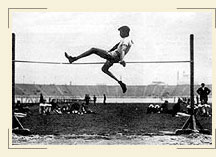|
 Ray
Ewry
Ray
Ewry
The Games of 1908 was the last organization in which participated one of the greatest track and field athletes in the history of the Olympic Games.  Ray Ewry won two gold medals, in the standing long jump and the standing high jump, adding them to the six gold medals that he had already won in the Olympic Games of 1900 (Paris) and 1904 (Saint Louis). In 1900 and in 1904 he had won in all three standing jumps, namely the long jump, the high jump and the triple jump (an event that had not been included in the Games of 1908). Therefore, with eight gold medals in three organizations he ranks among the all-round athletes, together with his fellow athlete Martin Sheridan and the more recent athletes Paavo Nurmi and Carl Lewis. What is more, in Paris he had won three times in a day. Among his distinctions should be included his victories in the standing long jump and the standing high jump in the so-called Interim Olympic Games, which was organized at Athens in 1906, as well as fifteen victories in the standing events in the national USA championship between 1898 and 1910. There is no doubt that Ewry had been the leading figure in those events that are no longer on the Olympic Games programme since the 1912 Stockholm Games. His opponent in the Games of 1908 was Konstantinos Tsiklitiras, who ranked second in both standing jumps, in which he excelled in Stockholm. Ray Ewry won two gold medals, in the standing long jump and the standing high jump, adding them to the six gold medals that he had already won in the Olympic Games of 1900 (Paris) and 1904 (Saint Louis). In 1900 and in 1904 he had won in all three standing jumps, namely the long jump, the high jump and the triple jump (an event that had not been included in the Games of 1908). Therefore, with eight gold medals in three organizations he ranks among the all-round athletes, together with his fellow athlete Martin Sheridan and the more recent athletes Paavo Nurmi and Carl Lewis. What is more, in Paris he had won three times in a day. Among his distinctions should be included his victories in the standing long jump and the standing high jump in the so-called Interim Olympic Games, which was organized at Athens in 1906, as well as fifteen victories in the standing events in the national USA championship between 1898 and 1910. There is no doubt that Ewry had been the leading figure in those events that are no longer on the Olympic Games programme since the 1912 Stockholm Games. His opponent in the Games of 1908 was Konstantinos Tsiklitiras, who ranked second in both standing jumps, in which he excelled in Stockholm.
Ewry was born on 14 October 1873 in the city Lafayette of Indiana. From an early age and until his puberty he was forced to move on a wheel chair due to a serious disease (poliomyelitis). He took up sport for therapeutic reasons, so that he could strengthen his legs and be able to walk, which he achieved at the age of 16. Since then he had practised sport systematically and at the age of 27, in 1900, he won his first three Olympic medals. As most of the American track and field athletes, Ewry was a student in an American university. More specifically, he had studied engineering at Purdue University, a profession that he had exercised after his athletic career. He died on 29 September 1937.
|